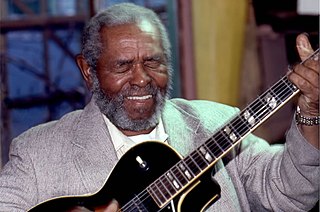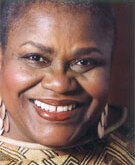
Walter Brown "Brownie" McGhee was an American folk music and Piedmont blues singer and guitarist, best known for his collaboration with the harmonica player Sonny Terry.

Bernice Johnson Reagon is a song leader, composer, scholar, and social activist, who in the early 1960s was a founding member of the Student Non-violent Coordinating Committee's (SNCC) Freedom Singers in the Albany Movement in Georgia. In 1973, she founded the all-black female a cappella ensemble Sweet Honey in the Rock, based in Washington, D.C. Reagon, along with other members of the SNCC Freedom Singers, realized the power of collective singing to unify the disparate groups who began to work together in the 1964 Freedom Summer protests in the South.
“After a song,” Reagon recalled, “the differences between us were not so great. Somehow, making a song required an expression of that which was common to us all.... This music was like an instrument, like holding a tool in your hand.”

Guy Hughes Carawan Jr. was an American folk musician and musicologist. He served as music director and song leader for the Highlander Research and Education Center in New Market, Tennessee.

The Abayudaya are a community in eastern Uganda, near the town of Mbale, who practice Judaism. They are devout in their practice, keeping kashrut and observing Shabbat. There are several different villages where the Abayudaya live. Most of these are recognized by the Reform and Conservative movements of Judaism. In June 2016, Rabbi Shlomo Riskin led a Beit Din that performed an Orthodox conversion for the Putti community of Abayudaya.

The New Lost City Ramblers, or NLCR, was an American contemporary old-time string band that formed in New York City in 1958 during the folk revival. Mike Seeger, John Cohen and Tom Paley were its founding members. Tracy Schwarz replaced Paley, who left the group in 1962. Seeger died of cancer in 2009, Paley died in 2017, and Cohen died in 2019. NLCR participated in the old-time music revival, and directly influenced many later musicians.

Uganda, is now ranked number three in Africa as far as music and entertainment is concerned. Uganda is home to over 65 different ethnic groups and tribes, and they form the basis of all indigenous music. The Baganda, being the most musically vibrant nationality in the country, has defined what constitutes culture and music of Uganda over the last two centuries.
Ella Jenkins is an American folk singer and actress. Dubbed "The First Lady of the Children's Folk Song" by the Wisconsin State Journal, she has been a leading performer of children's music for over fifty years. Her album, Multicultural Children's Songs (1995), has long been the most popular Smithsonian Folkways release. She has appeared on numerous children's television programs and in 2004, she received a Grammy Lifetime Achievement Award.

Luiz Floriano Bonfá was a Brazilian guitarist and composer. He was best known for the music he composed for the film Black Orpheus.
The Greenbriar Boys were an American northern bluegrass music group. who first got together in jam sessions in New York's Washington Square Park.

Songs to Grow on for Mother and Child is a collection of children's music by folk singer Woody Guthrie. Recorded in 1947 and first released in 1956 by Folkways Records, a remastered recording was issued by Smithsonian Folkways in 1991.

Dust Bowl Ballads is an album by American folk singer Woody Guthrie. It was released by Victor Records, in 1940. All the songs on the album deal with the Dust Bowl and its effects on the country and its people. It is considered to be one of the first concept albums. It was Guthrie's first commercial recording and the most successful album of his career.
Uganda is a religiously diverse nation with Christianity being the most widely professed faith. According to the 2014 census, over 84 percent of the population was Christian while about 14 percent of the population adhered to Islam, making it the largest minority religion. In 2009, the northern and west Nile regions were dominated by Roman Catholics, and Iganga District in the east of Uganda had the highest percentage of Muslims.
Harley Allen, better known as Red Allen, was an American bluegrass singer and guitarist known for his powerful tenor voice.
Steven Feld is an American ethnomusicologist, anthropologist, and linguist, who worked for many years with the Kaluli (Bosavi) people of Papua New Guinea. He earned a MacArthur Fellowship in 1991.

The Country Blues is a seminal album released on Folkways Records in 1959, catalogue RF 1. Compiled from 78 recordings by Samuel Charters, it accompanied his book of the same name to provide examples of the music discussed. Both the book and this compilation were key documents in the American folk music revival of the 1950s and 1960s, and many of its songs would either be incorporated into new compositions by later musicians, or covered outright.
JAZZ: The Smithsonian Anthology is a six-CD, box-set released by Smithsonian Folkways that covers the history of jazz. The set includes 111 tracks with representative works from many styles, including big band, dixieland, free jazz, fusion, Latin jazz, swing, and smooth jazz. An accompanying 200-page book includes essays, analysis, and photographs.

Betsy Rutherford was a performer of traditional music from the Appalachian Mountains who was known for her powerful, authentic singing style. In 1970, she recorded an album, "Traditional Country Music," which was released by Biograph Records in 1971. For the album, she selected songs that she had collected, mostly from friends and relatives.

Woody At 100: The Woody Guthrie Centennial Collectionis a 150-page large-format book with 3 CDs containing 57 tracks, including Woody Guthrie's most important recordings such as the complete version of "This Land Is Your Land," "Pretty Boy Floyd," "I Ain't Got No Home in This World Anymore," and "Riding in My Car." The set also contains 21 previously unreleased performances and six never-before-heard original songs, including Woody's first known—and recently discovered—recordings. It is an in-depth commemorative collection of songs, photos and essays released by Smithsonian Folkways in June 2012.
Mirembe Kawomera is an interfaith Fair Trade coffee cooperative in Mbale, Uganda. The cooperative is made up of Jewish, Christian, and Muslim farmers. Founded in 2003 by JJ Keki, the members of Mirembe Kawomera use music and fair trade coffee to promote peace between religions.












